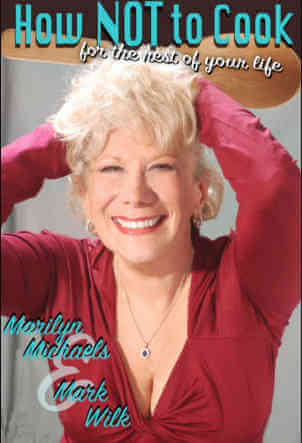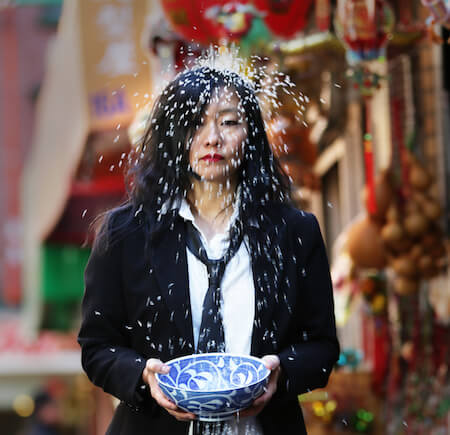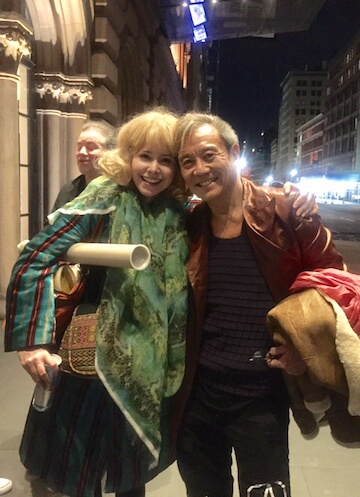Neil Berkeley’s “Gilbert” offers a surprising portrait of comedian Gilbert Gottfried. | ARLENE GOTTFRIED/ FUTUREYOUPICTURES.COM
If your basic impression of comedian Gilbert Gottfried is of an overbearing loudmouth who does nothing but spew obscenities and the most vulgar of jokes, you’ve only experienced the tip of the iceberg. Far more is revealed of this quite shy, sensitive, true eccentric in Neil Berkeley’s utterly disarming doc “Gilbert.” It charts his life from a Brooklyn misfit high school dropout who only came out of his shell at 15, with the discovery of comedy clubs proliferating across a Manhatan then more dangerous but far more interesting.
His résumé includes an early “Saturday Night Live” stint, appearances at every comedy club you can name, TV and movie work (disconcertingly, in Disney’s “Aladdin”), and the voice of the Aflac duck (before he was canned for insensitive statements about the Japanese earthquake). It also includes, surprisingly, a very happy family life, two adorable kids who brought out the natural, quite wonderful father in him, and a very lovely wife, Dara, who’s quite funny herself, and, obviously, a model of forbearance. She and the film’s talented director, Berkeley, joined Gottfried for an often uproarious meeting with Gay City News in Chelsea.
Showing his warm, fuzzy side, veteran comic revels in vintage showbiz gems
DAVID NOH: This film really surprised me. Of course, I laughed my ass off, but then I would often find myself kinda misting up at moments.
GILBERT GOTTFRIED: Thank you! One critic said the same thing, that our film will make you laugh and cry. Sounded like something you’d slap on a poster, a blurb of your own making.
DN: You allowed yourself to be so naked in front of the camera.
GG: The idea of me naked makes you laugh and cry at the same time. When I look at myself full frontal, I start crying. I get suicidal when I look at myself naked.
DN: The scene where you ran into those guys wearing Nazi uniforms at that war reenactment event was hilarious. You couldn’t make that up.
GG: We were in the same hotel as that convention. You can’t have a war without the bad guys and that was like gift from God. That is probably the only time you’ll ever hear that the Third Reich was a gift from God. The Nazi officers were in love with me, kept running over, yelling “‘Problem Child’ is my favorite movie!” Nervously asking if they could take a selfie with me.
One of them explained to me that they may have lost the war, but the Nazis won the fashion show. I’m standing around them, laughing and thinking, “You know, the Nazis got a bad rap!”
DN: So tell me about this podcast you have, which the Village Voice voted best podcast of 2015 and had Stephen King proclaiming you as a national treasure. I’m all about old movies, and I hear that is what you feature.
GG: My sidekick, Frank Santopadre, and I both love old movies and old showbiz. To me and other crazy people who love it, a superstar is someone like Janet Ann Gallow. She was a child actress who appeared in the 1940s in a film called “The Ghost of Frankenstein.” She told us she would play hide and go seek on the set, with Lon Chaney, Jr., and Bela Lugosi. I wish that had been my childhood.
DARA GOTTFRIED: The chance to talk to his heroes is why he has the podcast.
GG: I always said that when I was growing up the greatest film school in the country was right in your living room because TV showed old movies 24 hours a day.
One of the biggest treats was when Robert Osborne of Turner Classic Movies asked me to pick my favorite movies. It was a horrible homework assignment, having to choose like four best movies and that was dependent on if they could get their hands on them. We sat in those big easy chairs and talked about movies, loads of fun.
So the ones I presented were Todd Browning’s “Freaks,” Coppola’s “The Conversation,” the original “Of Mice and Men,” with Lon Chaney and Burgess Meredith that came out in 1939, which was a ridiculous time for movies, “Gone with the Wind,” “Wizard of Oz,” “Goodbye Mr. Chips.”
Another one I chose was “The Swimmer” with Burt Lancaster [from John Cheever’s book], strange film but fascinating. Another weird film came out with Karloff and Lugosi named “The Black Cat.” Obviously a pre-Code film, it has incest, necrophilia, Karloff is skinned alive. It’s so weird and usually when I see things that don’t make sense, I get angry. “The Black Cat” seems to makes absolutely no sense whatsoever and I don’t care!
I’ve had incredible guests on my podcast. Carl Reiner is amazing, remembers everything when I can’t even remember what I did earlier today. He sang some Italian opera and also an Irish folk song, because he always wanted to be a singer.
Bruce Dern told me he has always been a fan of mine, which is always a real thrill to hear. He, too, has a scary memory, like who did the catering on a movie he did 50 years ago. Amazingy, he said he was never into drugs. Surprise-surprise, Jack Nicholson was, but Bruce gets up every morning and runs.
NEIL BERKELEY: When we went to interview Dick Van Dyke, it was amazing. We drove to his house and it was kind of dark and then he appears.
GG: It’s scary how, at 90, he moves around so well, still dancing. Phenomenal.
NB: Filming them together was the only time I ever saw Gilbert hesitate about telling this filthy joke.
GG: I have such respect for him, and he never worked blue, as I did, never used a dirty word. Sometimes I will think twice, but I have to say it anyway. I think “Oh, I really shouldn’t say this,” but then the words come out of my mouth.
NB: Thank God he thought you were funny.
GG: What I notice with the older generation of performers is that most of them have a great sense of humor. They’ll laugh off camera at a filthy joke or word and tell one themselves. But on camera, these performers in their 90s won’t say anything because they don’t want to damage their image. I’m like, you’re 100, what’s the big deal?
DN: Okay, so I have to ask. What was your interaction like with Bill Cosby?
GG: [laughing hysterically with Dara and Neil] It’s funny. I worked with Cosby twice, he had me on two of his shows. And I ran into him once, doing “The Tonight Show with Jay Leno.” It was like when I met O.J. Simpson years ago, before all that happened. It was kind of a treat to meet him, he told me was a fan, and did an imitation. It’s kind of like meeting Charles Manson, and him saying, “I’m a big fan! I saw ‘Aladdin’ a thousand times!”
But I do remember meeting Cosby and then waking up in the street with my pants around my ankles and he’d be going [does Cosby impersonation], “Aw rawr, roozooraza roar!”
I heard that he cut ties with Coca Cola as their spokesperson because they made him advertise the New Coke, saying it was better than the original. But people hated the New Coke, and he felt that damaged his image because it made him look unreliable. Coke was the least of his problems! [Laughs.]
DN: Talk about Joan Rivers.
GG: I was crazy about Joan. She was a nut. I once went to this big birthday bash at the Stern Theatre. I was lucky enough to be sitting at a table with her and that was like a show in itself. All these celebrities would go by and, under her breath, she’d say “She’s a tramp, what a total slut. She fucked everybody!” Then another guy would go by: “Big fag!” The next day people would always talk about stuff she said. I roasted her on Comedy Central, and she said, “Watching Gilbert Gottfried makes me want to drive to Malibu and blow Mel Gibson!”
DN: Is your film eligible for an Oscar for Best Documentary?
GG: Yes, and if I do get an Oscar, I’m not going to show up and will send an Indian princess to receive it for me. [Laughs.]
NB: You should do the [legendary, notoriously filthy, and improvised] Aristocrats joke.
GG: [laughs] I’ll say, “This award means the word to me. A family walks into a talent agency…”
The documentary about that joke, “The Aristocrats,” completely disappeared. I don’t know who owns it. What shocked me the most was I didn’t expect anything to come out of it. But when it was released, it got this exposure and quite a following. I was doing “The Tonight Show” and heard someone call out, “I loved you in ‘The Aristocrats!’” It was Harrison Ford, and I thought, “Wow!”
DN: Your crazy persona, married to the usual pitfalls and temptations of your business, bring up the question of drug use.
GG: No drugs really. I remember grass, as I call it, or pot — it’s weed now — used to be more prevalent. People would pass it around. I stopped doing that and it was no big deal because what I found was that one puff would make me terrifically happy, a great time, but immediately after I’d think, “Wait a minute, what am I so happy about?” And then I would start getting depressed and the paranoia would set in. Say, if I were stoned now, I would think, “There are people downstairs listening in.” I was also one of those people who got that feeling of “Oh, am I ever gonna back to normal?”
By the way, your readers will love this. My favorite line in the film is from my grandmother who died at 104: “Even Gilbert, himself, says he’s a homosexual!”
GILBERT | Directed by Neil Berkeley | Gravitas Venures | IFC Center, 323 Sixth Ave. at W. Third St. | ifccenter.com | Through Nov. 9 only | In streaming release Nov. 14 at gilbertmovie.com



































